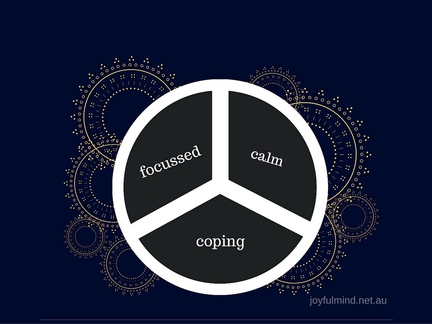|
Calm, focussed and coping: these are three major dividends a mindfulness practice will deliver. As we establish a mindfulness practice, we will notice calm becoming our daily companion. Calm is a result of befriending our mind and supervising our inner chatter. At the same time we will notice our brain getting brainier as focus naturally develops. As a result, mindfulness will become a flexible tool that steers us through life’s ups and downs, a reliable coping mechanism. Mindfulness helps steer a clear course through life by bringing attention to our here and now experience with an attitude of interest, openness and receptiveness. Dividend #1: A Calmer, Quieter Mind When your internal grumbler is on overdrive, mindfulness brings your attention to the inner commentary. The thoughts we don’t see are the ones that control us; we can gain objectivity by shining a light on our thought patterns and remembering “I am not my thoughts.” We don’t need to be so glued to our inner stories. Stepping back and witnessing thoughts, being the observer rather than the thinker, is the deal breaker. Once you’ve brought rumination out into the open, you can change it. Dividend #2: A Focussed Brain Blurry brain? Foggy mind? Mindfulness transforms a tired old brain into a snappy fresh one. The best mindfulness tool for a brain overhaul is meditation. Five minutes of breath awareness daily can kick-start your practice. Whereas techniques like cultivating positive emotion can be done at any time, meditation is a formal practice. It requires setting aside a time and a place. Your meditation investment will pay huge dividends. The hundreds of clinical mindfulness studies performed yearly concur: a short meditation practice done regularly relieves stress, anxiety and depression. It boosts the immune system and improves memory, concentration, focus, flexible problem-solving and decision making. During meditation, the mind wanders off again and again. We bring it back again and again. The process builds strong neural pathways in the brain that flow on to improved focus and presence in daily life. At the same time, meditation teaches us how to let difficult or unhelpful thoughts come and go without getting caught up in them. Divident #3: Coping Have your buttons been pressed today or this week? When under pressure or feeling threatened, the nervous system throws us into fight/flight mode. Mindfully breathing slowly and deeply is first-base for self-calming. We can then select from a variety of related mindfulness tools: body sensing, breath sensing, mindful movement, labelling emotions or connecting to our senses. Bringing attention to our here and now experience with an attitude of interest, openness and receptiveness changes our relationship to it. Instead of struggling against our experience we can allow it to be as it is. From that place of brave acceptance we can take the next mindful step. Like it? Share it!
I love to hear from my readers. Leave a comment via the orange comments link below. Mobile users click on website version to enable commenting. Or click the Facebook/ Twitter tab to share.
7 Comments
Helen McWilliam
1/3/2016 07:40:05 am
I think I'll start my day with steering to the left: lots of kindness and compassion as I listen to the rain this morning, Thanks shakti
Reply
11/10/2020 07:57:47 pm
Very well written. Nicely explained about the benefits one is going to get by practicing mindfulness. Definitely going to try it.
Reply
Shakti
11/3/2022 12:08:37 pm
Thank you Meenu
Reply
Shakti
11/3/2022 12:09:13 pm
Thankyou Deepak, glad you enjoyed it.
Reply
9/3/2022 10:25:04 pm
Just want to say thank you for this post. It is really amazing Blog post on <a href="https://yourmentalhealthpal.com/"> Mindfullness </a>.
Reply
Leave a Reply. |
Categories
All
Categories
All
|
ServicesYoga Online
Mindfulness Coaching |
|

 RSS Feed
RSS Feed